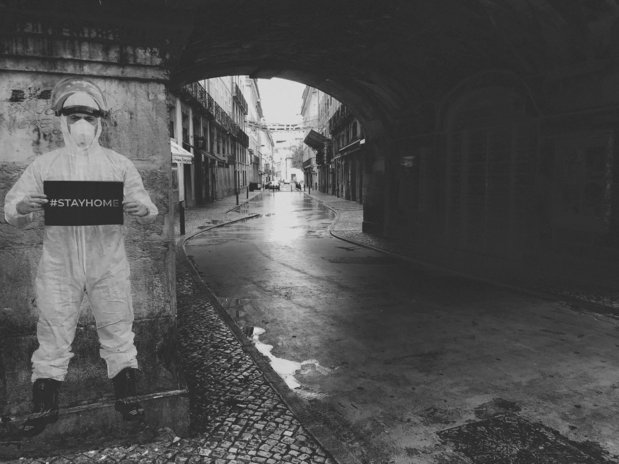Her Campus calling. (*insert Kim Possible ring tone*.) ‘Matthew,’ they tell me, ‘the big thing this week is in-person teaching. Everybody is talking about it. We need some of that. We want to know the truth. Real people, you know. What are their fears? Their anxieties?’
Fears and anxieties, you say?… Enter St Fessdrews.
Following a not-so-anonymous request for opinions, I had a lovely Saturday afternoon with a cup of coffee, catching up with ten of our fellow St Andreans over Teams and getting their perspective on the return to in-person teaching. These are *your* responses:
‘I actually feel really safe,’ a second-year English student told me, ‘The desks are marked off. There are cleaning supplies everywhere. It feels really clean.’ This was echoed by a fourth-year using a computer lab: ‘the rooms themselves are configured really well. However,’ she went on, ‘there was no social distancing outside of the room. We were left waiting for ten minutes without anything in place. It really defeated the whole point of distanced learning – we probably had all caught COVID by the time we got inside!’ This also appeared to be the case in most buildings where students could not wait out in the open before a class.
Although the evident attention to hygiene in the class spaces brought many peace of mind, others found that social distancing gave rise to other issues. ‘It felt safe, but it didn’t feel useful. The distancing made it really hard to hear other people,’ one Physics major told me. An exacerbated Economics student agreed. ‘There is so much miscommunication. It took us thirty minutes to get through one of seven questions set for our fifty-minute class. Nobody can understand each other.’
For those who could not return to St Andrews or are feeling too anxious to meet in-person, the University announced a programme of “blended” learning. How successful has this been so far?
An interviewee sighs. ‘Blended just isn’t working. The people on Teams are struggling to hear. As much as it pains me to admit this, I think online is working far better until we can meet as we normally would without restrictions.’ Another agrees. ‘Our professor is trying really hard to juggle everything, god bless her, but the set-up makes it so difficult. It slows everything down. I feel I learn more in the online classes to be honest.’ Only one third-year English student (me) responded positively to blended learning. Our professor had used her husband as a guinea pig the week before though, and had demanded that the technical issues encountered were ironed out before students were introduced.
So, for those feeling either anxious or that in-person just is not going to work for them, what of the option to opt-in and out of in-person teaching?
The Modern Languages department appears to have created an incredibly positive ethos. ‘There was no bias either way and it felt really easy to voice an opinion. I don’t think anyone felt they couldn’t make the decision themselves.’ The English department was similarly commended. ‘Everyone is being asked both in tutorial and in email. We can change our minds anytime. I actually missed the tutorial where we discussed the return, but my professor went out of their way to arrange a call and ask for my thoughts.’
The same freedom, however, was not felt by a Management student: ‘I asked my professor during a lecture if we had to come to in-person tutorials or if we could stay home if we felt anxious. She said that if we were in St Andrews, we had to come or else we would be marked absent. I’ve now been to three in-person tutorials and I’ve felt horrifically uncomfortable in all of them.’ A few others in Management and IR I know of described feeling that they were issued an ultimatum.
It’s not just students who feel they don’t have a choice either. Speaking with a PhD candidate in the Humanities, I heard that ‘the biggest issue is that a lot of staff voices are being lost. Obviously, our main interest is to offer the best service that we can to students. However, I know a lot of staff members who are feeling anxious but do not feel they can speak up. It’s really being dictated for us.’
So, do people feel that our university is doing its best?
Many responses offered a variation on the same theme: in my department, yes. However, when it came to the wider university it appeared this was not the case.
‘I feel it’s a top-down issue,’ one student suggests. ‘I think the staff are trying their best but the people in charge are making it harder for them. I feel staff should receive information just a little bit in advance so they can have time to prepare before they suddenly are faced with a bunch of questions from anxious students.’ Another interviewee was far more damning. ‘What’s really bothered me is the lack of planning. All my professors were so vague about how things might pan out – I wish they had just adopted a clear stance from the start so that we could make an informed decision. They gave the impression that we wouldn’t return to classrooms. Considering that cases were rapidly climbing, I decided to leave halls. (I live in Fife anyway, so it was far cheaper living back at home.) Now we’re back, I feel I moved in for nothing.’ She went on. ‘I was suddenly told after I’d left that I wouldn’t be able to collect my things afterwards, as had previously been arranged. I had been sending emails, follow-ups. I had no response. After a week I finally resorted to calling the University emergency hotline, only to be told that there wasn’t an issue. Why is there no standardised policy?’ She shakes her head. ‘I can’t believe I was ghosted by my own university.’
Still, some argued, we appear to be doing a lot better than some other universities.
‘When I compare with friends in England, I think we’re doing a great job!’ a fresher told me. ‘Some of them don’t even have accurate timetables! Their classes are shifting around each week because they keep having to adapt the facilities.’ Another first-year feeling the isolating impact of the pandemic was also very positive. ‘I’m glad we’re at least getting in-person teaching,’ she admitted, ‘I was really excited to be in a university building for the first time. To be honest, I’ve not really been to many other places apart from halls. I think it’s been great for my mental health.’
Moving forward, with the University announcing plans to make it easier to opt-out of in-person teaching, it looks like both Teams and the “blended” approach are here to stay for a while longer. If one thing became apparent over these interviews, it was that there was one unexpectedly unanimous agreement: ‘I wish everyone would keep their cameras on during online classes. If just a few of us had the confidence I think we would all do it. We’d all feel so much more comfortable.’
Her Campus would like to thank all those who shared their experiences for this article.



